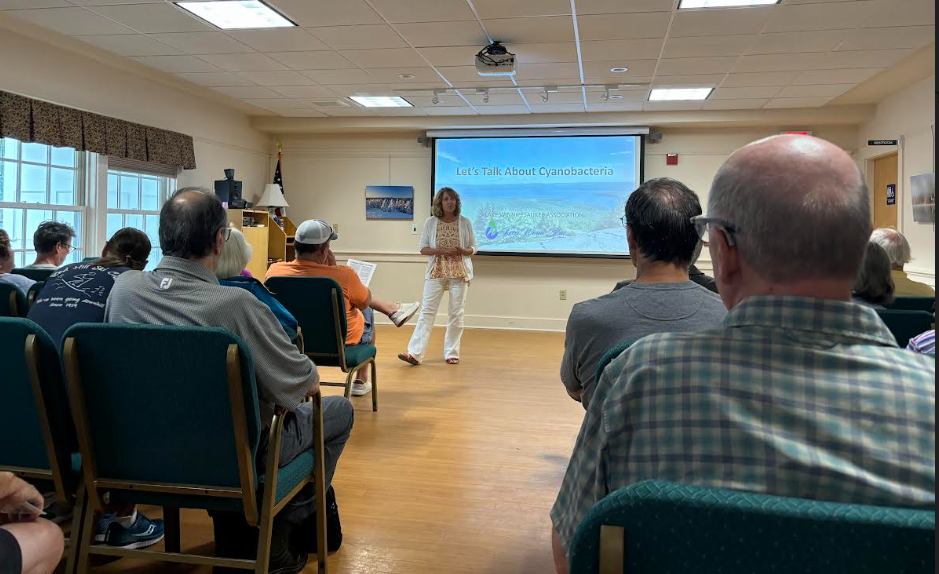By PAULA TRACY, InDepthNH.org
MOULTONBOROUGH – Lakefront residents concerned about cyanobacteria packed the Moultonborough Town Library Wednesday night and were told Gov. Chris Sununu has just vetoed a bill that sought to regulate the use of certain fertilizers on lawn turf.
Pat Tarpey, president of the Lake Winnipesaukee Association told a crowded room attending a “Let’s Talk Cyanobacteria” presentation that the governor had vetoed House Bill 1293 that would reduce nutrient pollution in waters that can lead to the excessive growth of native and invasive plants, algae, and cyanobacteria or blue green-algae.
It would have established conditions on when (during/before rain, or on frozen ground) and locations where (near storm drains, on pavement) fertilizer could not be applied.
The bill also would have required signs to be posted in retail locations where the products are sold, explaining the negative impacts of fertilizer on surface waters.
Despite easy passage in both Senate and House on voice votes and no organized opposition, in his veto message on July 17 the outgoing Republican governor said that the “well-sought intention to reduce fertilizer contamination, it contains several unworkable and impractical provisions” and said future legislation might be more specific to lake areas.
“We’re obviously disappointed that the bill was vetoed,” said Andrea LaMoreaux, president and policy advocate for NH LAKES.
“I’ll be reaching out to some Representatives to see if an override of the veto might be possible this fall,” LaMoreaux said said when the House and Senate reconvene to try to override vetoes.
Fertilizers containing phosphorus limits oxygen in the water and can feed contamination and is considered a contributor to cyanobacteria blooms, which have been increasing in recent years.
“Rather than focusing on areas close to bodies of water, this bill would restrict any citizen or business in the state from applying fertilizer to a lawn within 25 feet of a storm drain,” Sununu said.
“This would put countless well-meaning families unintentionally in violation of the law when maintaining privately owned lawns.”
Exempt from the bill would be sod farms and golf courses.
Sununu said in his veto message that the Department of Agriculture would have a difficult time enforcing the law and the state would be “entirely reliant on neighbors telling on neighbors rather than direct action by the agency.
“If the intent of the Legislature was to reduce the impact of these fertilizers in New Hampshire water bodies, then I encourage future legislation to be more targeted toward lakes, streams, and other environmentally sensitive areas as well as include a practical mechanism for enforcement.”
The Lake Winnipesaukee Association has been holding a series of “Let’s Talk Cyanobacteria” meetings around the lake which have been well-attended, and scheduled after an unprecedented number of cyanobacteria blooms were identified on Lake Winnipesaukee in mid-June. They have not since reappeared.
A meeting in Meredith attracted over 120 people. About 75 attended in Moultonborough and another event is set for today (Thursday, Aug. 1) in Wolfeboro at the Town Hall at 4 p.m.
A link to the series of events is here https://www.winnipesaukee.org/lets-talk-about-cyanobacteria/
The LWA staff went over what cyanobacteria is, its dangers and what the association is doing to protect the water.
The discussion included information about septic systems, stormwater runoff, lawn fertilizers and measures that can be taken by homeowners to help out.
As of Thursday, Aug. 1, the state Department of Environmental Services posted cyanobacteria alerts at Long Pond in Pelham and Sebbins Pond in Bedford.
And cyanobacteria advisories at Cobbetts Pond in Windham, Gorham Pond in Dunbarton and Hopkinton Dike Elm Brook in Hopkinton.
These can change daily so best to check here: https://www.arcgis.com/apps/dashboards/8d84a6b03acb4efaab571b222c78447b
According to DES, “a cyanobacteria warning (advisory) is issued lake-wide when cyanobacteria cell concentrations exceed 70,000 cells/mL Warnings are not based on toxin evaluation but occur at cyanobacteria cell count densities when toxin production may be likely. These are intended as a precautionary measure for short-term exposure to cyanotoxins.
“A watch may also be issued for a waterbody to serve as a statement to be on the watch for a potential cyanobacteria bloom. Sometimes watches become warnings, and sometimes the bloom will pass before a warning is issued.”





